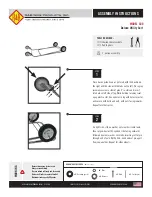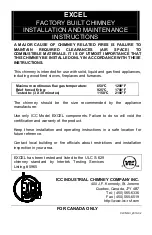
PROBLEM
POSSIBLE CAUSE
SOLUTION
NOTES
Propane tank was not purged properly
Return the tank to an authorized propane station
and re-purge the propane tank.
The Purge process requires that all air is removed
from the propane tank prior to the first fill
The OPD float valve on the propane tank has
been activated, closing the valve and not
allowing the tank to fill.
Attach the regulator to the propane tank, turn the
control valve on for a few seconds to reset the
OPD float valve.
The OPD float valve is a safety device which is
activated when the propane tank has been filled
too quickly.
Control valve not closed completely.
To shut off the valve, push the control valve in
slightly to unlock and turn to the right (Clockwise)
completely.
The far right position on the control valve is the
off position
The regulator was not properly secured to the
propane tank.
Disconnect the regulator and reconnect it properly
to the propane tank.
The Regulator needs to be tightened securely &
fully to the Propane Bottle to prevent propane
leaks & to supply the correct amount of propane.
The tank was not purged properly, it contains a
mixture of air and propane. The results is
intermittent flame, or flame extinguishes in a short
period of time.
Burn off the remaining propane and re-purge the
tank.
The purging process requires that ALL the air is
removed from the propane tank during the first fill
to ensure maximum efficiency. See your local
authorized propane dealer.
In cooler temperatures, the liquid propane does
not convert quickly enough to gas therefore
causing the tank to freeze on the outside.
Turn the control valve to the low position where
the flow is not as high.
Flame setting too low.
To Increase the flame, Turn the control valve
clockwise to the 12 o'clock position to get the
maximum amount of BTU's.
Flame setting too high.
To lower the flame, Turn the control valve counter
clockwise from the 12 o'clock position a quarter
turn to the set low position and a lower amount of
BTU's.
Spiders may have created webs or insects may
have created nests inside the venturi or orifice.
Make sure the fire pit is not is use & has not been
used recently and the unit is cold to the touch so
as to not get burned. Make sure the control valve
is in the off position. Close the propane tank valve
or the fix piping supply line valve. See page 12 of
this manual on Converting Your Fire Pit to a
Different Gas Type on how to access the venturi &
the orifice. Insert a small wire in the venturi &
orifice holes to clear passage free of spider webs
or other debris. Make sure to put everything back
correctly when finished for proper fire pit operation
and safety.
This is a common problem when the fire pit has
not been used for an extended period of time.
Low or Excessive Flame
Using Natural Gas
The water column may not have been adjusted
correctly.
Contact your local licensed plumber or certified
tech for assistance.
Fire Pit Wobbles
Cement slab or the use of natural stone may not
be completely even.
Optional adjustable fire pit glides are available
through your local dealer.
Optional glides are perfect for areas where the
draining slope to level out a fire pit.
TROUBLE SHOOTING GUIDE
Propane Tank Does Not Fill
You Smell Propane or
a Rotten Egg Smell
Immediately Stop!
See Warnings &
Instructions
on Page 1
Flame Problems:
No Flame
Intermittent Flame
Low Flame
ADDITIONAL CARE AND INSTRUCTIONS
DO NOT
remove the glass wind guards until it has completely cooled, approximately 1/2 hour. Check to be sure that all glass guard connector fittings have not come
loose after the cooling process.
DO NOT
lift the glass wind guard until connector fittings hardware has been checked and is still secure to the glass guards. Glass connectors may have become
loose after use. Make sure all glass connectors are secure after each use of the glass wind guard.
Clean
glass wind guards only after completely cool to the touch, approximately 45 minutes after use, with water and white vinegar mix or commercially available
streak-free glass cleaner and a soft cloth.
DO NOT
touch glass wind guard for 30-45 minutes following use.
It will be hot.
Fire Pit Base -
Rust seepage and or oxidation may occur in some crevices. The area can be easily serviced by using a detail brush and or fine grit sandpaper. Once
the are is clear from rust seepage or oxidation, follow by wiping clean and applying touch-up to seal the crevice. Contact your local dealer for the matching touch-up
pen or aerosol.
Hammered Copper Tops -
Using a stainless steel polish will help protect & keep the top looking nice. Note: Always use coasters when setting drinks and or food on
the top. Spilling acidic drinks and food may discolor the hand applied patina. Should the patina be removed with acidic elements, the area will darken over time.
Porcelain Table Tops
- Clean with mild soap and water. Rinse with clean water to remove all soap residue. Note: The grout is made from a durable outdoor epoxy
which does not need to be sealed.
Page 10











































